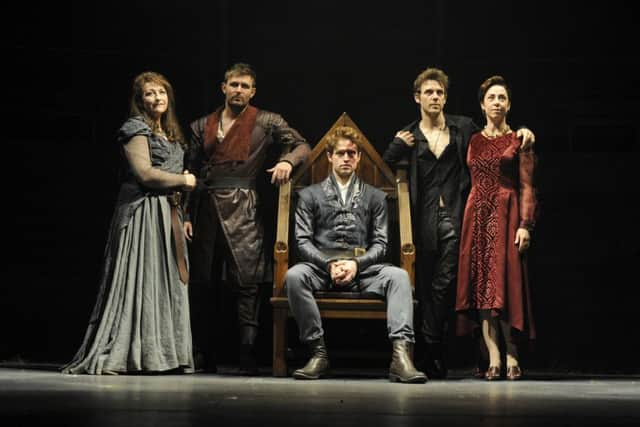Dispatches from the front line of modern Scottish theatre


Theatre in Scotland: A Field of Dreams is a collection of theatre reviews by Joyce McMillan, due to be published at the end of this month, that traces her journey from self-taught, passionate contributing writer to the short-lived Sunday Standard (1981-83), to her current life as the chief theatre critic of The Scotsman. No other critic in Scotland covers as much ground as she does in her working week, or has done for so many years. And so the premise of the book is simple: gather all of the most insightful material from over the past three decades, add new essays by McMillan herself to underscore the narrative – and what you have is a history of modern Scottish theatre, reported from the front line. The volume is not a hit parade. While the vast majority of landmark theatre productions in Scotland have been covered, it was important also to acknowledge McMillan’s footfall across the whole country and celebrate the truly national portrait that emerges.
McMillan’s first reviewing jobs were for BBC Radio Scotland in the 1970s, talking about Edinburgh Festival shows for Festival View, presented by Neville Garden – and she credits the inspiration of this annual cultural spectacle as a determining factor in her ambition to write about theatre. In 1978 the great Allen Wright at The Scotsman commissioned her to cover a production of The Good Person of Szechwan for him in St Andrews, and she soon became his second string reviewer. When the Sunday Standard was founded in 1981, McMillan set her sights on becoming their principal theatre critic, and, despite the newspaper lasting only two years, it is here that she begins to find her voice, or, as she puts it, “This is where the dialogue with myself really starts.” There followed ten distinguished years as the Guardian’s Scotland theatre critic (1984-94) and three at Scotland on Sunday (1994-1997), where for the first time she was writing a longer weekly column, essay-style, covering all the week’s theatre openings, and exploiting her skill in detecting wider cultural resonances and thematic links between the work. After a lightning-quick spell as an arts writer for the Herald in 1997, she started in 1998 at The Scotsman, and it is in this current incarnation as a critic and political commentator that she has become defined as a leading thinker and writer about Scotland.
Advertisement
Hide AdShe wasn’t born to it. There were visits to the theatre as a child – her first memory is of a Kenneth McKellar Christmas show at the Alhambra, Glasgow – but she was never an enthusiastic amateur audience member, or certainly not for very long. A half-completed PhD at the University of Edinburgh on the tragedies of Ben Jonson crystallised for her the indivisibility of theatre and politics, and she talks interestingly about her new passion for theatre at that time stemming from her disenchantment with the direction of British politics, i.e. towards the right, and a conviction that theatre is one place where you might find “an alternative truth about what it means to be human”. And perhaps it is this wide-angle lens on theatre and parallel enquiry as a political writer which explain her tenacity and longevity. Of course, she’s not the only theatre writer to apply herself to political writing – think of Fintan O’Toole, for many years political columnist and chief theatre critic of the Irish Times – but McMillan’s career is coinciding with the very period where Scotland is remaking itself more energetically than ever before. The ground is fertile.


It is surely the goal of any critic, certainly in terms of legacy, to contribute in some way to the evolution of the art form itself, Kenneth Tynan in England and America in the 1950s and ’60s being the iconic example of this. McMillan has far too long a working life left for it to be possible to make this kind of retrospective analysis, but certain themes do emerge from her critical writing which arguably have tuned with the times, if not influenced them: for example, an obstinate insistence that the director of a classic revival must know very precisely why they are reviving an old play rather than making a new one – her sympathy for directors who also have to run monolithic theatre buildings does not extend to them programming plays just because they feature in compendia of “the 100 greatest plays”. Predictably, as a leading political commentator, she will despise an unthinkingly or lazily apolitical interpretation of a play, reserving her greatest spleen for the “Loamshire” play (as Tynan did before her), or self-absorbed new writing that makes no attempt to connect with the public sphere. But then – in a wonderfully contradictory way – she will often surprise us by enthusing about something shamelessly sentimental, entertaining or romantic, as long as it’s beautifully executed. Most importantly of all, she has, to my knowledge, an almost unblemished record in never having failed to spot a great new play; and, rare among critics, she has the ability to watch an unsuccessful new play and detect whether it’s the playwright or director at fault. This can make for uncomfortable reading. (“Philip Howard’s Traverse production seems to fall stillborn on to the stage” on Grace in America by Antoine Ó Flatharta, Scotland on Sunday, 1 May 1994 – sticks in the mind.)
She isn’t shy of skewering some sacred cows: the empty heart of the RSC’s Les Liaisons Dangereuses (1990); the reactionary flippancy (Travesties, 1987) and bourgeois self-satisfaction (Rough Crossing, 1996) of Tom Stoppard. And occasionally she deploys a devastating ability to take hold of a superficially successful production – think Bill Bryden’s The Big Picnic (1994) or the Brian Cox The Master Builder (1993) – and then, like a drone or laser, zero in on its fatal flaw. But McMillan is also bold in finding something to commend even in work of mixed success, and stick her neck out to champion unfashionable work which she suspects her colleagues might dismiss. Perhaps this is because she knows it’s easier to write a bad review than a good one, intellectually easier to puncture than to validate. And so there are plenty of roses among the barbed wire – and an unswerving commitment to shout praise from the rooftops where it is due, and celebrate the art form in all its mad, messy glory (Macbeth on the Isle of Inchcolm, 1989).
Students of theatre criticism may enjoy the underlying portrait of a critic teaching herself to be the best, from the passionate newcomer at the Sunday Standard in the early 1980s, trying to find her style but never missing a political beat, through mounting confidence, occasional fierceness of judgement and an increasingly fine writing style, to the older, authoritative and interestingly more mellow critic that we have today. She testifies to the collegiate atmosphere of theatre criticism in Scotland, where being part of that “public conversation” helps ensure that the genre faces outward – and guards against the lonesomeness of the profession. And ultimately, it is as a writer about Scotland and about what the art form of theatre can tell us about Scotland that distinguishes McMillan’s work. Sometimes it’s in the critique of a theatre production which would not be taken as seriously by the rest of the Scottish theatre community (even if they had seen it), that she writes most flawlessly about the culture of the nation – for example, Accounts in Town Yetholm (1991) or Bright Water on Easdale Island (2007). The combination of this panoramic view, political acuity, and the ability to marry the head and the heart, has sealed her reputation far beyond Scotland’s borders. ■
• This is an edited extract from the introduction to Theatre in Scotland: A Field by Dreams by Joyce McMillan, edited by Philip Howard, published as a £14.99 paperback by Nick Hern Books on 30 June. Joyce McMillan will be at the Borders Book Festival, Melrose, today at 5pm; at the Traverse Theatre, Edinburgh, on 29 June at 7:30pm and at the Edinburgh International Book Festival on 16 August.